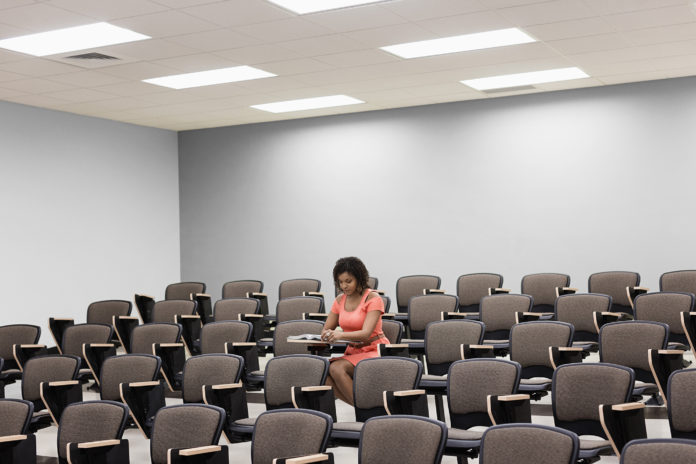What’s the matter with school?
Schools are no longer built to educate. They are built to profit.
Schools are textbook handlers and sellers. The best textbook, the one that is best for learning, is not selected by school boards to become mandatory reading for students. No, best is subjective. The title of best can be bought for a price. The textbook from the country whose leaders dashed your country’s president the most money is the textbook that is adopted.
The same happens next year. And the next. And eventually the pictures in a Ghanaian primary or secondary school textbook feature children from Scotland and Pakistan, Russia and South Korea, Chile and Canada. All of a sudden, the examples for the physics problems highlight the velocity of a roller coast or the temperature of snow. No matter that the idea of a roller coaster, a machine to which I should voluntarily strap my body to be catapulted forty feet into the air and upside down—for my enjoyment?—no matter that this idea is foreign and strange. No matter that I will never feel snow, that snow has no relevance to my everyday life.
Quickly school, and textbooks of roller coasters and snow, no longer makes sense to the local boy or girl who has no need to imagine a roller coaster’s or snowflake’s landing. School becomes something impractical and distant. School sounds irrelevant.
Teachers are no longer built to educate. Teachers live to complete another year because every additional year guarantees a more secure pension. Teachers aim to move up the occupational ladder to attain the title of head teacher—though not in a giddy eagerness to transform the school based on personal pedagogical philosophies they have developed over the course of their decades-long careers, but so they can retire at the head teacher’s salary and multiply their comfort.
More, teachers cannot possibly be experts in their respective fields if they refuse to write and write profusely.
I imagine that teachers, in an ideal world, would be fine essayists having observed, time and again, the barrage of grammatical mishaps on behalf of their students. I imagine that teachers would be certain not to make any such blunders in their own writings. But many teachers today do not write what they know or what they have observed to preserve this knowledge for the next generations. Like the schools, the teachers are preoccupied with earnings—over or under the table.
How then is the student supposed to learn in this environment?
But the student, too, is not an innocent who is without motive to gain material wealth.
Students, in fact, are no longer built to be educated. Students, like schools and teachers, have eyes blinded by flashing hazard lights of monetary gain.
Students aim for high test scores while seeking admission to fine professional schools to ultimately secure the coveted doctor or lawyer positions. There is no need to belabor this point, which is well understood. School for the student is a means to an end, the same end that has transfixed the mission of the school and the mind of the teacher.
So much for learning, then…
The school, one’s hopes, and one’s dreams, today, are all baked in the same dough of currency—the currency dough. The learning dough has become rotten. No one wants the learning dough anymore, so that bread baked from the learning dough is going to waste. The currency bread though is in high demand. That queue is out the door and around the corner. The wait is hours long, while the other queue is empty. Any takers?
I, for one, am waiting for the game to go full circle as it always does. I am waiting for learning to become a thing again. Learning for learning’s sake and not for earning’s sake. I am waiting for schools and educators that do not necessarily go back to how things were before—those writings are lost or burned or unfinished or uncomposed…we will never know!—but schools and educators that take what we know and love and reinvent what it means to learn, and how, and do so with great purpose.
Taking our education, our reading, and our writing seriously is the necessary step to envisioning our freedom. To eat from the currency dough is to fill our bellies, for sure, but with empty calories. The learning dough, however, provides full nourishment. Only, to my utter dismay, some schools, teachers, and students prefer the taste of the currency dough, while others cannot tell the difference.











I think first education across Sub Saharan is dominated by religious institutions which is a logical consequence of its origins in missionary roots… but religious institutions can only use education to indoctrinate the masses from a tender age to ensure religious adherence and economic (brand) loyalty in their adulthood… in other words education is first and foremost a religious tool to pin down the masses in economic slavery…
Most importantly, education and education policy and curriculum must be wrestled away from religious institutions but this requires a new way of thinking and ideology on the part of African governments. Such an ideology would necessarily move education policy from it’s current emphasis of producing en masse superstitious and subservient clerical class (obedient to church and business) into moulding critical thinkers who can take ownership of their destiny as well as that of the nation…
Great points Mkuki. Many people do not realize the great extent that religion is woven into these mission colonial schools. And this indoctrination also makes our men fearful of their own power and beholden to another power that looks nothing like their image. Funny how symbols work. Our education is in need of real changes.